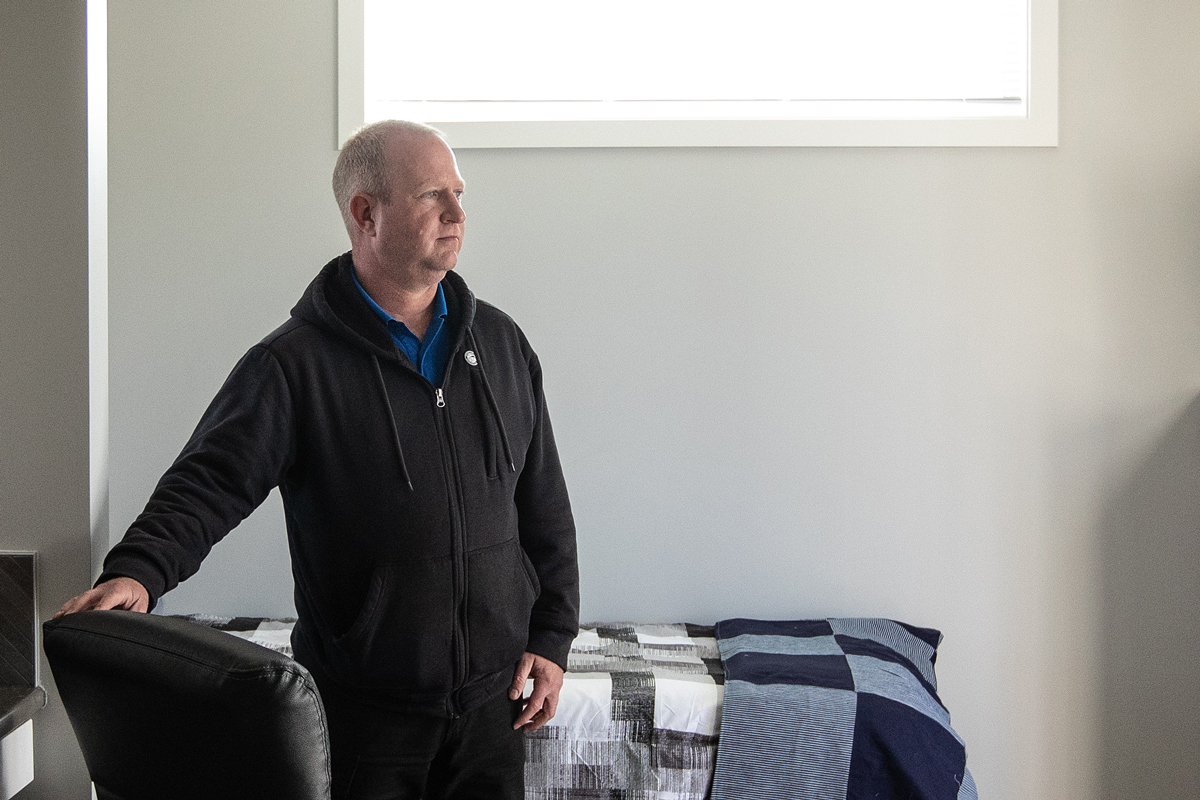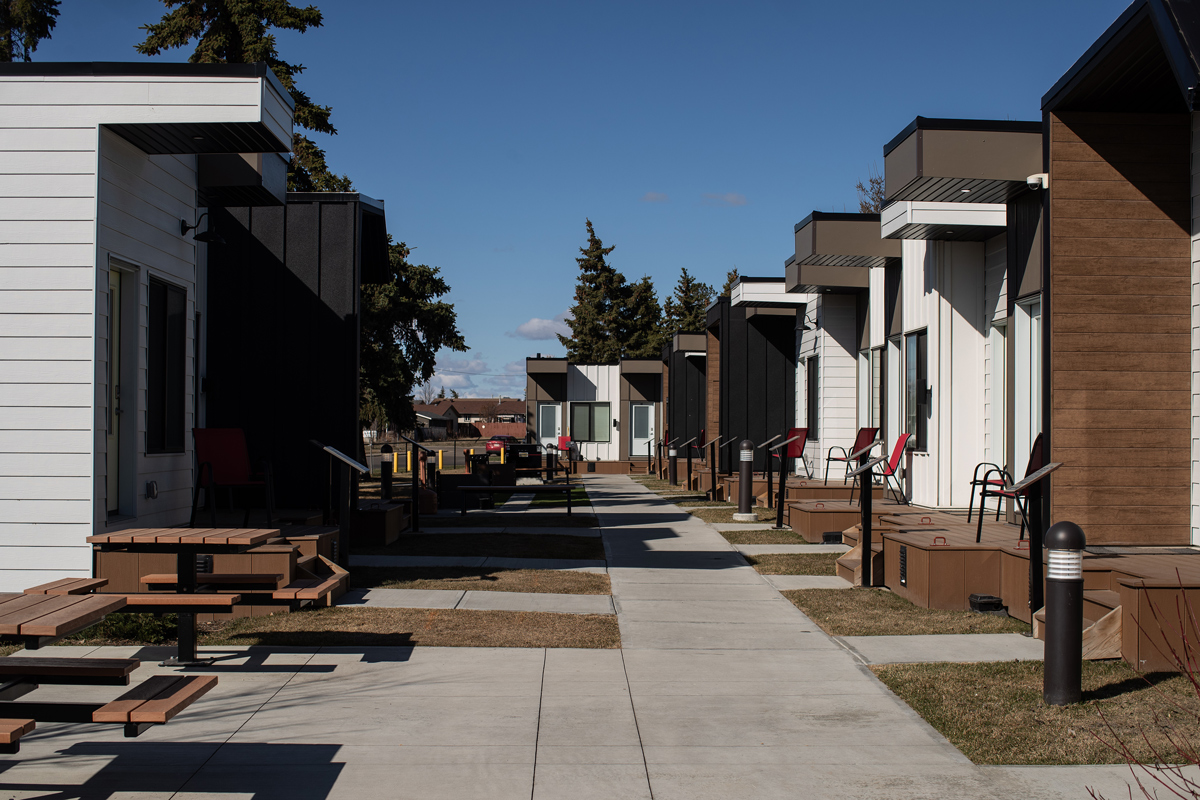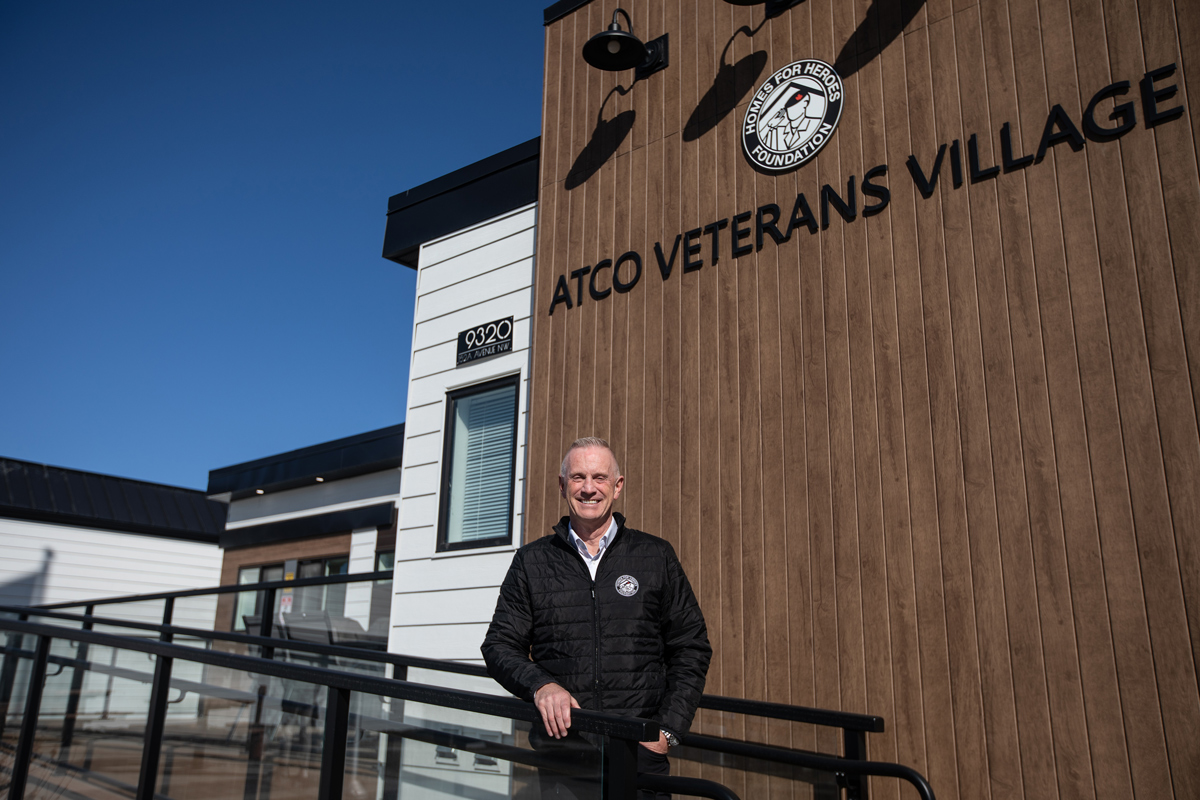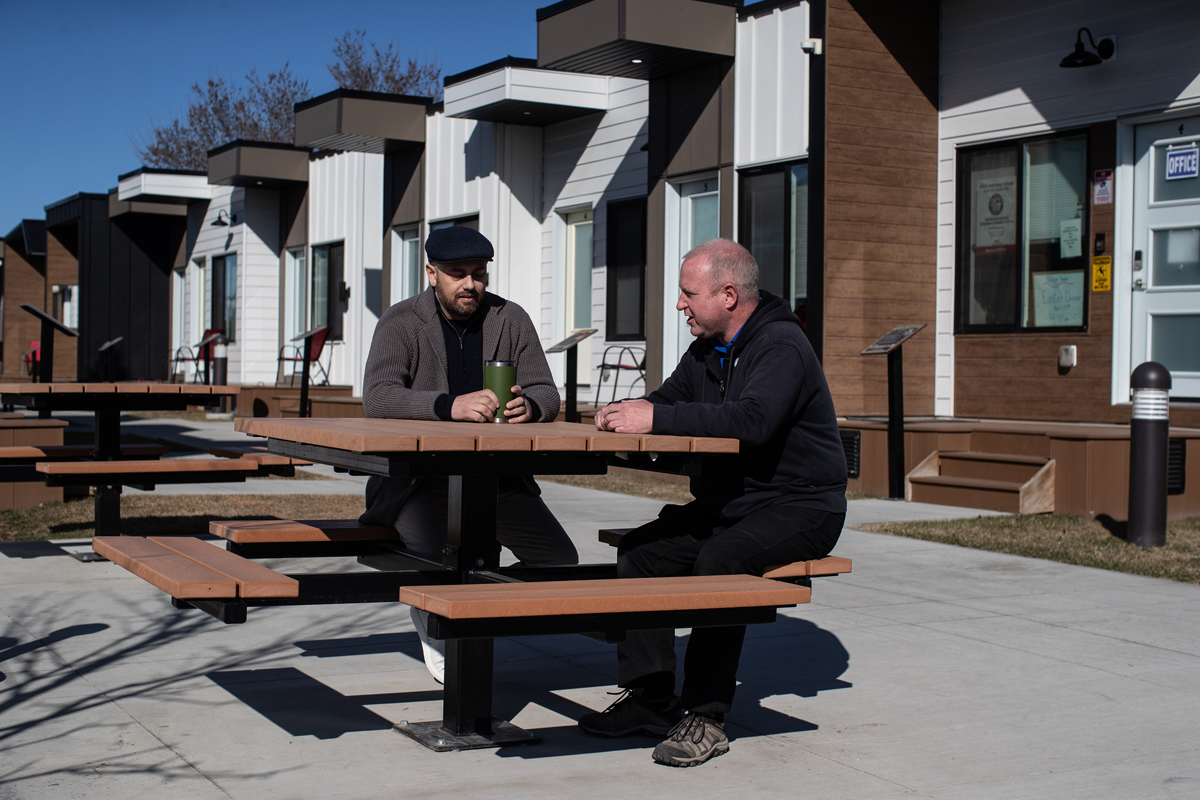AT A GLANCE
- By the time he reached out for help, Jeremy, a military veteran, was living in his car, feeling completely hopeless.
- The Homes For Heroes Foundation provided Jeremy with a safe and secure home, a supportive community and above all, hope for the future.
- Homes For Heroes villages provide affordable homes, support and resources to help veterans process and manage trauma, while transitioning to civilian life.
- Now a Homes For Heroes ‘graduate,’ Jeremy provides peer support to other veterans living there.
Jeremy thought about many things as a gunner with the Canadian military forces in Afghanistan ─ like falling back on his training if attacked, keeping his fellow soldiers safe, and making it out alive. What he didn’t think about was ending up homeless, living out of his car.
It’s been a tough road, but he is finally able to focus on new horizons, thanks to the support he has received from the Homes For Heroes Foundation.

A career plan, derailed
Jeremy, now 43, was deployed to Afghanistan in October 2009 until May 2010. He was one of some 40,000 Canadians who served there between 2001 and 2014 to stabilize the country and fight the extremist Taliban regime.
“We lost a few people on our tour, and a lot of people were injured,” says Jeremy, adding that he suffers from post-traumatic stress disorder (PTSD). “We had a few combat situations… some rough days. I lost one of my good friends over there.”
His tour of duty complete, Jeremy signed up to continue his military career. He also got married and moved to Alberta to work at Canadian Maneuver Training Centre at Canadian Forces Base (CFB) Wainwright. He spent 7 years there until discharged in 2019 following a serious back injury which he describes as “…a massive blow. I had decided that I wanted to be in the military,” adding that it was like losing his “family.”
His marriage had ended a few years earlier. He moved to Edmonton, hoping to find a job or go to school and build a life there. The COVID-19 pandemic made that difficult. When his disability benefits ran out, Jeremy moved in with a friend and her family.
“That didn’t work out. I had undiagnosed PTSD, and I was depressed. I had a slew of mental health issues. I knew I was spiralling down. I didn't want to take it out on them anymore.”

The right help at the right time
Jeremy left his friend’s place in the summer of 2023. Homeless, living in his car and feeling completely hopeless, Jeremy contacted Veterans Emergency Transition Services (VETS) Canada, then the Veterans Association Food Bank, which put him in touch with the Homes For Heroes Foundation.
The Foundation exists so that Canadian Armed Forces veterans, many of whom merited medals for their service, do not find themselves homeless.
They offered me a place to live and helped me when I was at my absolute lowest.
Foundation president and CEO Brad Field says that unfortunately, Jeremy’s story is not uncommon. Current estimates show that up to 10,000 Canadian veterans who served their country are now homeless.
Brad says that in many cases, the challenges facing the veteran homeless population are similar to those facing non-veterans without homes. These include trauma, unstable childhoods, addiction, mental and physical health issues – but time in service can add to those issues.
“Things you've had to do in service of your country or things you've witnessed can exacerbate those trauma effects,” says Brad. “Physical disabilities are a big part of it too, and of course, addiction is at the forefront.”
Additional challenges facing veterans:
- Returning home after isolation from family and friends to find things have changed.
- Returning to tough family situations or poor job prospects.
- Managing responsibilities like cooking, laundry and paying utility bills, particularly for those who entered the military out of high school.
- Lack of government-issued identification, information or skills needed for things like setting up accounts and obtaining credit with financial institutions.
Some veterans may even find themselves on the streets with the cash from a military pension or disability benefit cheque.
We recognize what it takes for a person who has served their country to ask for help. It’s a massive step, especially when you come from a military background.
Others feel shame or guilt, especially when returning to friends or family who disagree with some military efforts.
“After you have served your country and, in some cases, in the worst possible environment, and having done the unimaginable, to be thought of as a hero and then have to admit that you’re not capable, or that you need help, it’s a lot to carry.”
Launched in 2018, the Foundation’s mission is to end veteran homelessness by providing homes, resources and services to manage the transition to civilian life.
To date, the Foundation has built 3 Homes For Heroes villages providing 20 homes in Edmonton, 15 in Calgary, and 20 in Kingston. Further construction is planned for Winnipeg and London this year. Discussions for villages in Hamilton, Toronto, Ottawa and other locations on Canada’s east and west coasts are ongoing.

Safety, support and camaraderie
For most veterans, the length of stay ranges from 6 to 24 months.
Rent and utility costs are kept to an affordable level, case workers are on hand at the resource centres to support the veterans as they transition to civilian life. This might include help with access to health services, benefits, training and education programs, as well as life skills like budgeting and cooking.
Being with other veterans who understand what they’re going through is also key, Brad says. "There's huge value in that, and that's why we design our villages the way they are. We have a community… our veterans can come together and share their stories and talk about each others’ experiences.”
Jeremy agrees. The camaraderie veterans can find right outside their door in the Homes for Heroes villages is crucial.
“One of the things I realized when I got out of the military was, for the 13 years that I was in, there is always somebody there to watch my back. I knew that that the person beside me had gone with the same training I had had experience some of the same things that I had. They knew what I'd been through. Getting out, I didn't have that anymore.”
Paying it forward
After 8 months at Homes For Heroes Edmonton, Jeremy was able to get back on his feet and find part-time work. He’s one of about 90 program ‘graduates.’ Jeremy says he will be “forever grateful” for having a place to live, support with mental health, paperwork, and for just “listening.”
“I’ve re-discovered myself,” says Jeremy, who gives back to the program as a volunteer peer support worker.
He plans to return to school for a degree in social work in the hopes of turning his appreciation for Homes For Heroes into a full-time career.

“The struggles they go through, I’ve been through. The 2 case workers here do the majority of the work. I do the: ‘Hey, I’ve been in your shoes’ part.”
One of the veterans Jeremy speaks with is Arthur, 42, who served from 2008 until he was discharged in 2023 due to injuries. In August 2024 Arthur moved into the Homes For Heroes unit once occupied by Jeremy.
Eventually I’m going to have to do this on my own…but at least for a while I can depend on Homes for Heroes being the answer that I need.
Arthur says without Homes For Heroes, he would have no place to live. He spent most of his career at CFB Shiloh, Manitoba. His left hand was crushed by heavy equipment on the job. He also suffered injuries to his back and chest. Due to mix-ups with pension and disability benefits Arthur was temporarily without income, living with his foster family in Edmonton.
“I'm in severe pain constantly. I was not able to work. I felt I was a huge burden on my [former] foster family.”
Arthur preferred to leave rather than damage his family relationship, but he had no place to go. Finding a home with Homes For Heroes was a “huge relief,” adding they helped him apply for the military pension and medical benefits, and access rehabilitation services.
“Eventually I’m going to have to do this on my own,” Arthur says, “… but at least for a while I can depend on Homes For Heroes being the answer that I need.”
KEY FACTS
- The Homes For Heroes Foundation was supported by the Affordable Housing Innovation Fund.
- The Fund supports new ideas that will drive change and disrupt the industry – ideas and approaches that will evolve the affordable housing sector and create the next generation of housing in Canada.
- Funding, support and resources were also provided by the City of Edmonton, the Province of Alberta and private donations.






 Share via Email
Share via Email
